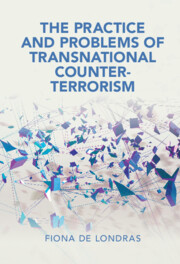'Twenty years after 9/11 this book is a must-read for those interested in the effects of sustained counter-terrorism practice on international law, international institutions and the rule of law. de Londras gives us a sophisticated account of the inner workings of global counter-terrorism practice revealing its rule of law and institutional deficiencies. She provides a searing account of the human rights failures of the past two decades and the costs for both security and rights that have followed.'
Fionnuala Ní Aoláin - Regents Professor and Robina Chair in Law, Public Policy and Society University of Minnesota Law School & Professor of Law, The Queens University of Belfast, Northern Ireland
'This remarkable book is the first sustained, multidisciplinary, theoretical critique of the world’s emergent, hydra-headed “transnational counter-terrorism” regime. It charts the decentralised multiplicity - and opacity - of this new order’s innumerable public and private institutions and its often hegemonic state sponsors; its ever-expanding universe of laws, “soft” norms, and practices; and the ill-defined and risk-laden creep from countering terrorism to countering violent extremism. The book is a powerful warning against the erosion or subordination of constitutional, rule of law, human rights and civil society safeguards, and the limited accountability of United Nations and other transnational actors. This is a must-read for anyone trying to make sense of the sprawling field of counter-terrorism law.'
Professor Ben Saul - Challis Chair of International Law, University of Sydney
'You cannot claim to understand the global legal order without reading de Londras’ book. The book’s scope and depth reveal a system which outwits, outmanoeuvres and defies traditional legal analysis. Crossing the breath of the counter-terrorism landscape, the book tells of a multiplicity of actors, structures, and laws now omnipresent with stupendous power and resource. The book’s clarity belies the complexity it describes. The book’s lessons are of import to everyone seeking to understand how contemporary legal governance works.'
Aoife O’Donoghue - Professor of International Law and Global Governance, Durham Law School
‘This is a field-defining work, unprecedented in its scope, its multidisciplinary sophistication, and its mastery of detail, exposing how the global machinery of counter-terrorism is reshaping international law and relations from the mundane to the foundational. Rendering a stunning set of technocratic documents and institutional practices visible and intelligible, and delivering on the ambition of explaining why 'the world has a problem with counter-terrorism' (and why that problem matters), de Londras’s book is deserving of the widest readership.’
Naz K. Modirzadeh - Harvard Law School
‘The Practice and Problems of Transnational Counter-Terrorism provides the most detailed map yet of the complex post-9/11 architecture of global security law. De Londras shows how seemingly disparate counterterrorism projects at different sites and scales are interconnected in practice into a powerful new form of international legal ordering and highlights the profound political and normative stakes that arise as a result. This book will be indispensable reading for lawyers, counterterrorism scholars, policy-practitioners and others concerned with the dynamics of international and transnational lawmaking, the erosion of human rights and the expansion of unaccountable security powers.’
Gavin Sullivan - Edinburgh Law School, The University of Edinburgh
‘Highly recommended.’
J. P. Smaldone
Source: Choice



